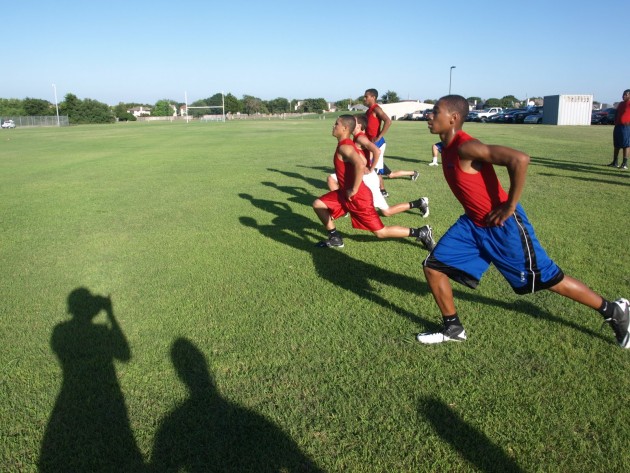
Dynamic Flexibility Exercises
Sport-Specific Flexibility
Dynamic flexibility work is necessary for teaching your body to move more safely, efficiently, and powerfully. You simply can’t get the job done by performing static stretches alone.
Static volleyball stretching basically relaxes and turns off your muscles. By performing a dynamic stretching routine, you are going to wake up your muscles activating them while you are moving.
Athletes often develop tightness and inflexibility because of the repetitive movements that make up their sport. Sport specific stretching can be done to help balance out the strength and flexibility issues they’ve developed from these repetitive movements.
Dynamic Flexibility for Increasing Explosive Power
Dynamic exercises stretch your muscles actively and awaken your nervous system.
The muscle’s stretch reflex is activated during dynamic flexibility training. The stretch reflex is an important component of volleyball jump training or plyometrics.
The purpose of plyometrics is basically to quickly stretch a muscle then contract it right away in order to utilize the muscles reflexive response to the stretch.
Dynamic stretches help your neuromuscular system to function more efficiently which results in the better utilization of the stretch reflex.
Dynamic stretching should be done prior to a plyometric workout to warm up your muscles and awaken your nervous system.
Dynamic Flexibility Exercises
Forward Hand Walks
Hands walks are a great total body dynamic stretch exercise for volleyball.
Purpose:
To build stability and mobility at the shoulders while lengthening your hamstrings, calves, and low back muscles.
Starting Position:
Stand with your legs straight and your hands on the floor.
Action:
While keeping your abs braced and your legs straight, walk your hands out. While still keeping your legs straight, walk your feet taking small steps back up to your hands.
Coaching cues:
When taking steps, you shouldn’t be using your quads or hips. Use your ankles to take small steps back up to your hands.
Forward Lunge Walks
Lunges are one of the best dynamic exercises to use in warm up. Volleyball players that aren’t familiar with this movement will likely experience an unfamiliar soreness. Lunges work the long adductor muscles, the muscles that run down the inside part of the thigh.
Purpose:
To stretch the front side of the hips while warming up all the leg hip extensors.
Starting Position:
Stand up straight with your hands behind your head.
Action:
Take a large step forward and bring your back knee to about 3 inches off the ground. Push through the heel of the back foot to bring your back foot up even with your front foot. Repeat the lunge with the opposite foot.
Coaching cues:
Keep your torso vertical and abs braced throughout the movement. Your step should be just big enough to bring your front knee above or slightly in front of your front ankle.
Straight-leg Deadlift Walk
This is a great dynamic hamstring stretch. This flexibility exercise is very much like the one-arm one-leg deadlift total body exercise.
Purpose:
To improve hamstring flexibility and balance along with dynamic stabilization at the hips and core.
Starting Position:
Stand with arms straight out to your sides, thumbs pointing up while balancing on one foot.
Action:
Bend forward at the waist and lift your back foot up keeping the leg straight while maintaining good posture. The front leg should be slightly bent to help with balance. Bring your upper body back up and leg down at the same time.
Coaching cues:
Keep your shoulders back and down and abs braced. Your shoulders and heels should move at the same time, keeping a straight line from shoulders to heels. The range of motion will be limited by the flexibility of your hamstrings. Only go so far as you can with good technique.
Walking Quad Stretch
Dynamically stretching the quads and hip flexors.
Purpose:
To dynamically stretch the quadriceps and hip flexors while also training balance.
Starting Position:
Stand up straight.
Action:
While bracing your core, grab your foot with the same side hand. Pull your heel up to your buttocks stretching your quads. Bring the foot back to the ground and perform the stretch on the other side.
Coaching cues:
Remember, this isn’t a static quad stretch. The purpose is to stretch dynamically, so you shouldn’t be holding the stretch for a long time. This exercise should be done standing in place or while you’re slowly walking.
Lateral Lunge
You can place your arms together out in front of you like you are going to make a volleyball pass when performing this exercise.
Purpose:
To dynamically stretch the muscles of your groin and hips.
Starting Position:
Stand with feet shoulder width apart.
Action:
Step to the right, keeping your toes pointed straight ahead and your feet flat on the ground. Squat back and down towards your lead leg. Keep your back leg straight and your weight over the lead legs heel. Squat as low as comfortable, hold for 2 seconds and return to the starting position.
Coaching cues:
Keep your body and feet facing ahead. Your knee should end inline with your foot when lunging. Try to keep your lead knee above your lead ankle or midfoot, NOT out in front of your toes when lunging to the side.
You will get a great return on your time invested in dynamic flexibility exercises.
Taking just 5 to 10 minutes a day to perform dynamic exercises before you workout for volleyball will increase your sport specific strength along with volleyball specific flexibility.
Read more Fittness articles.
Check out our Stretching section. Every Sunday a new story. Tomorrow read about Why is stretching important?